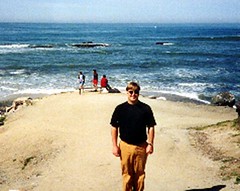
So I got the following CFP on Wed, 6 May 2009 14:25:54 -0400:
Dear Colleagues,Now Andrew Gurr is one of my absolute cultural heroes, even if all he had EVER done was write this. But THEN he also wrote this and helped uncover this for good matter plus a lot else to boot. Quite a career indeed!
The American Shakespeare Center, in partnership with Shakespeare's Globe in London, will host its fifth Blackfriars Conference, "Inside Out/Outside In," in honor of Andy Gurr in Staunton, Virginia, from 20-25 October 2009. Registration fee includes tickets to the ASC productions of 1 Henry IV, The Merry Wives of Windsor, Titus Andronicus, Much Ado about Nothing, and The Rehearsal by George Villiers (et al); opening and closing banquets; a special presentation by the ASC actors honoring the work of Andy Gurr; and Paul Menzer's Shakespeare on Ice, a play and cocktail party.
We are inviting proposals for papers on topics to do with early modern drama in performance, including but not restricted to the staging, texts, design, repertory, personnel, and the business of plays in early modern England. Paper presentations are limited to 10 minutes (presentation without actors) and to 13 minutes (presentations with ASC actors). Presenters should be aware that they will hear the sound of a thundersheet when two minutes remain and will exit pursed by a bear when time is out.
Submit a 300 word abstract and a short bio to Sarah Enloe, Director of Education, by May 30, 2009. Please include a brief statement saying whether or not you would be interested in having your work in a volume of Blackfriars Conference essays.
It just so happens I had a handy piece about staging one version of The Merry Wives of Windsor! So I sent in the following:
The 1602 Merry Wives of Windsor Quarto as City Comedy
The Merry Wives of Windsor exists in two distinct versions: its first Quarto (1602) and the First Folio (1623). Specifically, the Quarto takes place either in London or an unnamed provincial town, while the Folio version is resolutely located in the royal village of Windsor, hard by the castle. Ironically, the later Folio version might represent the original version of the play as written for the Feast of the Garter in 1597. Sometime later perhaps, Shakespeare might have reworked the play for the commercial stage, hoping to capitalize on the rage for city comedy, which had been developing since the late 1590s. I focus on the Quarto version of the play, which highlights the connections to city comedy, and which I take to be closer to the version performed on the London stage.
Throughout the play Falstaff operates as a prototypical gallant: he wears peculiar dress, makes passionate love to assorted women, is a notorious gamester, and resides at the Garter. But Shakespeare inverts the typical gallant situation by having Falstaff, his urban gallant, gulled by the commercial classes of the town. I also connect Falstaff's character to gender considerations. From such gender considerations, we see the underlying metadramatic concerns of The Merry Wives of Windsor, a play very much concerned with contemporary London theatrical practices whatever town it supposedly occurs in. The Quarto's "location" allows Shakespeare to comment upon the class tensions at once central to theatrical alehouses as illustrated by the pairs Sly and the Lord and Hal and Francis and important to the burgeoning contemporary city comedy, a genre which directly links the alehouse scenes of the fifteenth and sixteenth centuries to the coffeehouse scenes of the late seventeenth and early eighteenth centuries.
G.E. Light received his PhD from Stanford in 1994. He was Assistant Professor of English at Mississippi State University from 1996-2003. His publications include "Beer and The Bard" (1996), "All Hopped Up: Beer, Cultivated National Identity, and Anglo-Dutch Relations, 1525–1624” (1998), "Falstaff’s Cups of Sack: New Readings of Henry V II.iii.25" (2002), reviews in Albion, Renaissance Quarterly, and Text, and a "virtual" dialogue with Bryan Reynolds on "the naming-function" in chapter one of Transversal Subjects: From Montaigne to Deleuze after Derrida (2009), published today! Currently he blogs The Nevermind Aesthetic and is a freelance journalist focusing primarily on music and publishing in a variety of venues including Dusted Magazine, Stylus Magazine, and Perfect Sound Forever, and a DJ at WMSV. He produces record reviews, was a columnist writing about "Seconds-Perfect Moments in Pop", has done artist interviews with Marshall Grant, Kevin Shields, Plastic People of the Universe, Robert Ellis Orrall, and written some longer think pieces about such topics as the hidden history of Southern urban blues and 90s Noise Rock.

No comments:
Post a Comment